QT BUSINESS

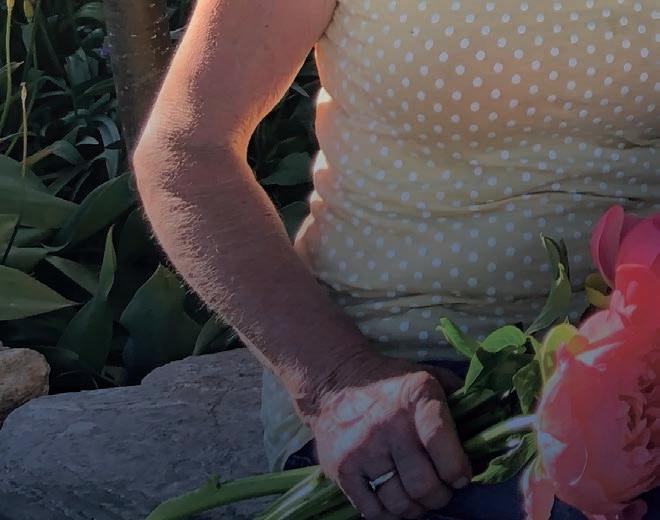

Issue 25 – December 2022
Suzi Q’s Garden – Bringing Life to Christmas
e quest to farm regeneratively and produce food on scale has become a labour of love for New Zealand celebrity chef and TV presenter Nadia Lim and husband Carlos Bagrie, who hails from a generation of Wakatipu farmers, working their 460ha Royalburn Station on the Crown Terrace. A er producing traditional barley crops and sheep for the rst two seasons the couple branched into some brave experimental crops and trials 18 months ago, incorporating regenerative farming practices to boost soil health, longevity and production.

Regeneration on Royalburn
by Sue Fea
However, Carlos says it’s much easier to use livestock to regenerate the soil than crops. “ ey are on continuous pastures (so roots are never disturbed), eating grass and chicory, and depositing manure, giving back natural fertility to the soil in a circular ecosystem,” he says.
Royalburn has trialled natural fertilisers, and sh hydrolysate has proven to be a winner by boosting microbial activity, and producing healthy highyielding crops in the Wakatipu’s sodium-depleted soils.
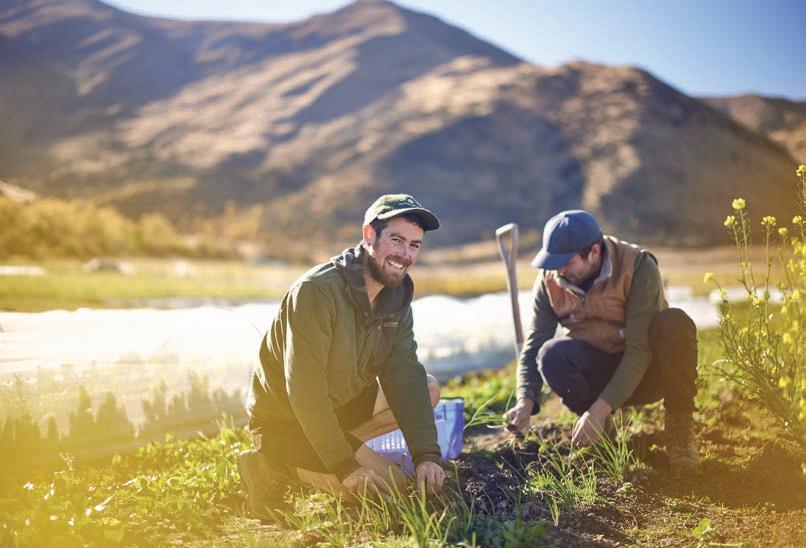
“Many of these are practices that New Zealand farmers have been doing extremely well for decades.”
In addition to its arable and livestock farming, Royalburn carries 3,500 pasture-raised, freerange chickens, producing masses of high quality eggs, a 2ha organic market garden and 60 bee hives. is produce is snapped up by local restaurant chefs and the public through the Royalburn Farm Shop in Arrowtown. eir cereal and sun ower crops – for oil, malting and feed, are spray free and kept local, while the specialist pea seed varieties and Phacelia seed are exported to Europe.
e Royalburn team grow crops in rotation such as sun owers that help aerate the soil, add back carbon and boost microbiological activity. Peas are another huge crop – a couple of hundred acres of peas have been sown on the farm this season, and these provide natural nitrogen to the soil. Phacelia – a beautiful blueish ower related to borage, also grows on mass, and is a great soil conditioner and food source for the bees, says Carlos.
“We’re still famous up here for our cereal crops –wheat and barley, and we supply Altitude Brewery which makes for a nice local story.”
It’s been a lot of hard work, but Carlos says through a combination of the types of plants they grow, the soil and the expertise of the farm’s team of growers they’re producing sensational produce, lamb, other meat, and eggs with standout quality and avour. “I’m not just saying that. It really has made a di erence,” he says. “We built an MPI-approved micro, mobile abattoir on the property where we process our lambs. Homekill means they don’t leave the farm and there isn’t the usual stress associated with their last day. We believe if we are going to eat them, we owe it to them to have the best life – and death – we can possibly give them.” It also translates to higher quality meat, he says. It tastes better and saves on fossil fuels.” Food miles can be kept to a minimum when you’re only transporting from Crown Terrace to the likes of Amis eld.
“We’re very fortunate to be able to do that here. Queenstown is a hub for some of the nest restaurants in New Zealand and we’re fortunate to have partners at that level.”
It’s been a huge task for the couple to take on. So why do it? “ at’s something I ponder regularly,” grins Carlos.
e cooler southern climate has been the biggest challenge so far.
However, Wakatipu farming’s in the blood for this Bagrie. Carlos hails from generations of Bagrie Queenstown Hill farmers, his grandfather among them. Growing up on a Southland sheep farm, Carlos’s family spent many holidays in the Wakatipu with family here. “I’ve always had a hankering to return to the land,” he says. “It’s in the blood. ere was a huge draw and I always wanted to come back to the Wakatipu if I could.”
QT BUSINESS December 2022 | Issue 25
Royalburn Farm head of market garden Dave Kingan (left) and Carlos Bagrie busy at work on the farm
Carlos and Nadia in the Royalburn woolshed
He and Nadia were just very fortunate that Royalburn came on the market when it did, he says. “Our background was with My Food Bag, cookbook publishing, food TV and media. We thought in light of all that, ‘Let’s go boots and all into primary food production and learn about soils, seeds and livestock, to learn how food was produced. It’s probably turned into something much bigger,” says Carlos.
“We’re very much at the beginning of our own journey. What has worked well for us – for example, the crops we grow and being direct-tomarket, will not necessarily work for someone else.”
People have categorised farms as factories that use diesel and produce methane, but really they’re living, breathing organisms, says Carlos. “Every farm sequesters carbon. Every leaf is a solar panel. We want to increase carbon levels in our soils as it improves the lands resilience by increasing microbe populations and moisture retention, which helps to protect soils during periods of drought,” he says. Important in the hot Central Otago climate, that moisture retention in the soil could provide a bu er of ve or six days for Royalburn. at could translate into savings of tens of thousands of dollars not having to buy in feed.
Big demand for community garden plots
by Sue Fea
Regenerative practices have been applied since the inception of Queenstown Community Gardens 13 years ago, where demand has continued to increase for plots as produce prices soar.
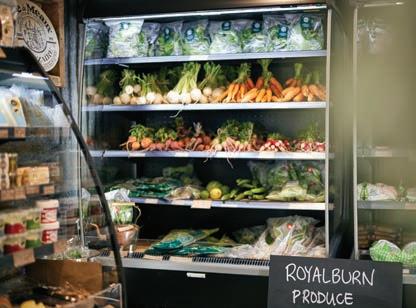
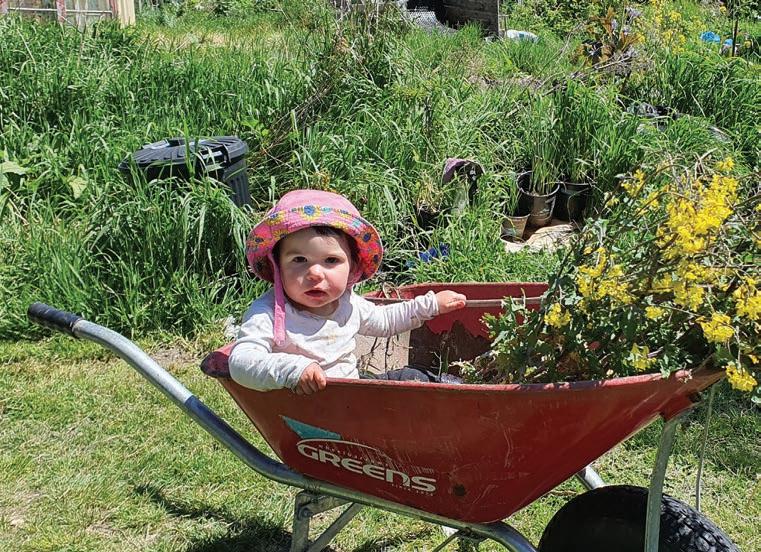
Treasurer Megan Palmer says they’re seeing a huge amount of interest from local people wanting to secure plots as the cost of groceries has risen signi cantly. ere are 80 individuals signed up at present, growing produce on about 70 plots at the gardens. “We’re back to a waiting list again, but we’re working our way through it as a few people lose interest,” says Megan. “We have whole ats of young people taking plots to grow their own vegetables and save money.”
been applied, ever since the inception of the community garden plots back in 2009, says Megan. Many members are into permaculture and no dig, however, the constant battle with couch grass makes this a bit of a challenge.
“We’re pesticide free, we grow cover crops to prevent soil erosion and we use mulch to retain moisture and suppress weeds.” Garden rules stipulate no chemicals or pesticides, only organic fertilisers, such as sheep pellets, chicken and horse manure.
“Many regenerative practices such as rotational grazing have been utilised on New Zealand farms for years, and many farmers should be praised for what they’ve been doing,” says Carlos. “Our focus has been on increasing our farm’s resilience by building topsoil. at’s by increasing our carbon stocks, using less tillage and where possible reducing inputs like synthetic fertiliser, pesticides and fungicides.”
Carlos has many ideas to experiment further with more herb varieties. Chicory grows extremely well locally and is very high in Omega 3 and 6. “Feeding our lambs on that for the last three or four weeks helps produce a beautiful sweettasting meat.” It’s also really great for the soil. Sainfoin is going in next and Carlos has plans to experiment mixing this with lucerne.
ey’ve already had a Masters student on the property digging holes and doing soil pro les to check the increase in carbon in Royalburn’s soils and the results are promising even a er one year. “ at’s what we’re looking for.”
In an exciting new initiative, a new community plot of raised garden beds has been created, thanks to several grants from Te Hau Toka – Connecting Communities; Sky City and the Queenstown Lakes District Council. Queenstown Community Gardens’ volunteers are growing vegetables here to be donated to community agencies, mainly Baskets of Blessing and Happiness House, and to Abbey eld.
“Several of our members help at Baskets of Blessing and our new president, Paula Squireomas, volunteer cooks at Abbey eld,” says Megan, who herself regularly donates preserves to Abbey eld, such as rhubarb compote and chutneys, made with produce from the Gardens. “People don’t know how to make preserves anymore so if we have excess fruit in our orchard that’s a little less than perfect, many don’t know how to make use of it,” she says.
Members at the Gardens regularly barter and swap food.
Regenerative agriculture principles have always
Comfrey has proved to be a winning crop at regenerating the soil and grows plentifully at the Gardens. It’s been used by Maori for generations as a fertiliser before they plant potatoes, is a healthy chicken feed, and is planted all around the Gardens fruit trees, providing a healthy boost.
“Because it has such a deep taproot it draws up the nutrients into the leaves and the ower attracts bees and bene cial insects,” says Megan.
Megan and several other gardening members make a very e ective comfrey and beeswax salve, which is excellent for treating bites, stings, skin conditions, arthritic joints, and as a poultice on sprains or breaks. Calendula ower petals, yarrow and plantain growing in the gardens are also used in the homemade salves.
e Exchange Café, e Co ee Hatch and NZSki donate their spent co ee grounds to the Gardens and the plastic bags are returned and reused by the Exchange Café. e grounds are used as a mulch, added to the compost bins and make a wonderful soil conditioner.
ere is a planting of native trees at the southern end of the Gardens, and nearby native plantings on the wetland attract birds and help keep insects under control.
QT BUSINESS December 2022 | Issue 25
Little Valentina takes a break while her parents, Mark and Chechu Connaughton, tend their plot at Queenstown Community Gardens
Fresh Royalburn produce on sale at the Royalburn Farm Shop in Arrowtown
Strawberry picking back on the menu – Red Bridge Berries
by Sue Fea
by 45 percent in the past 12 months – fertiliser’s gone up more than 100 percent, fuel’s risen, wages are up 30 percent, grass seed 25 to 30 percent, and interest rates have doubled,” says Rebecca. Ben still works full-time o farm to help with rising costs. “If you’re not a grower or farmer you don’t really understand we do this for love.”
It’s not like they have spare time either, with Rebecca expecting their third child in the peak of the season in January when the Trotters will have three under three. “ ere’s a shortage of good labour,” she jokes.
Just 10 minutes from Wānaka on Shortcut Road (SH8A) between Wānaka Airport and Luggate, the couple’s banking on some good local support this summer and a busy season. eir little on-site café, selling real fruit ice cream, co ees and iced co ees, o ers the perfect nale to a hot session fruit picking. “ is is a real family a air. at’s one reason we did it. We want kids to see how and where food is grown, while reducing carbon emissions and food miles,” says Rebecca.
Memories of childhood strawberry picking expeditions warm the heart for many - once a highly-sought a er family day out, and strawberry picking with all its trimmings is back on the menu this summer.
A young Wānaka couple, Ben and Rebecca Trotter, started their careers in the agriculture sector in the North Island, moved south ve years ago to a Wānaka farm property and decided their own treasured childhood memories should be relived.

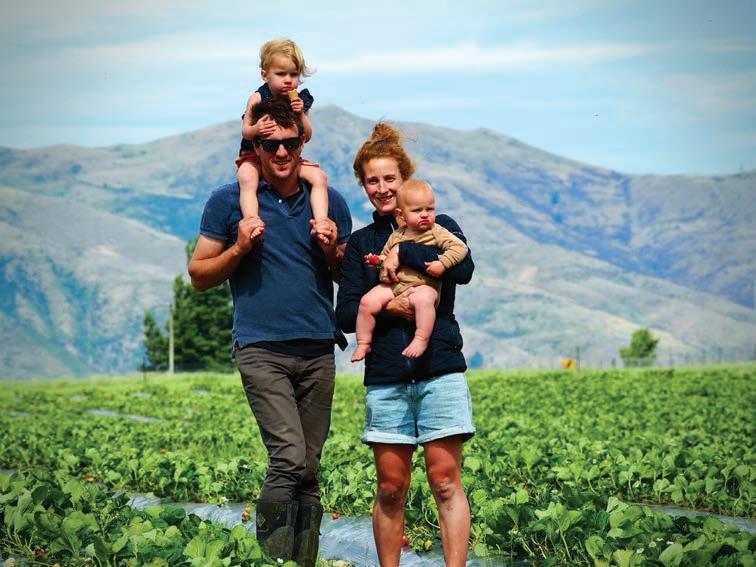
“I grew up in the Bay of Plenty and there are a lot of strawberry gardens there where you can pick your own,” says Rebecca. “It was a real childhood thing for me. When we bought the beef farm here with our family we wondered why it wasn’t done here,” says Rebecca.

With both, Ben and Rebecca having degrees in Agricultural Science and Business they got busy, planting a traditional strawberry farm on their property - 2ha of strawberries, more than 70,000 plants. “I’m half Canadian and I knew you could grow strawberries in a cold climate so we did some research and trials.”
Using Integration Technology Systems and good practices they were able to avoid using any harsh chemical sprays last season. at was quite an achievement with the strawberry industry internationally previously having a reputation for being among the highest users of sprays in the world, she says. “ ere’s a whole bunch of management strategies that can be applied and many New Zealand growers are doing a fantastic job at trying to use these rst,” says Rebecca. “We use crop rotation and if we get a pest infestation we buy in bene cial insects to get
it under control before contemplating using chemical sprays.” Spiders, ladybugs, parasitic wasps and the likes are set to it. “We didn’t spray at all last year.” Plants are monitored daily, dead leaves are pruned and air ow increased. “ is is a dry environment and a windy site so we’ve been lucky to not face some of the challenges other growers may have with humidity and insects, and so far no birds.”
e Trotters use seaweed technology to boost plant health, but some things are out of their control.
“We probably lost ve tonne of strawberries – our rst crop for the season, due to late frost in early October during that big snowfall, which was pretty disappointing,” says Rebecca.

Wānaka and Queenstown restaurants have been very supportive with chefs reporting strawberries are back on the menu. “ ey say they’re the best and most avoursome they’ve ever tasted,” says Rebecca, proudly. ey also supply Nadia Lim’s Royalburn Farm Shop in Arrowtown, and some grocery outlets. Growing strawberries is for love not money. “Our farming costs have risen
ere’s no waste with any surplus or damaged strawberries frozen and sold over winter. “You open the bag and the aroma comes out. It’s amazing, and with the hepatitis scare from imported frozen berries we’ve noticed a big up,” she says.
She even successfully trialled growing watermelons last year with 100 due to ripen in March, also pick your own and sold in the café shop.
QT BUSINESS December 2022 | Issue 25
Ben and Rebecca Trotter with their two children, Florence, (left), and Edward (right), in the Red Bridge Berries strawberry fields
Picking your own strawberry’s is a fun family experience
Garden gate to plate – The Sherwood
by Sue Fea
e produce the restaurant gardens grow virtually writes the menu on a daily basis for executive chef Chris Scott at Sherwood Hotel, where the planet comes rst.
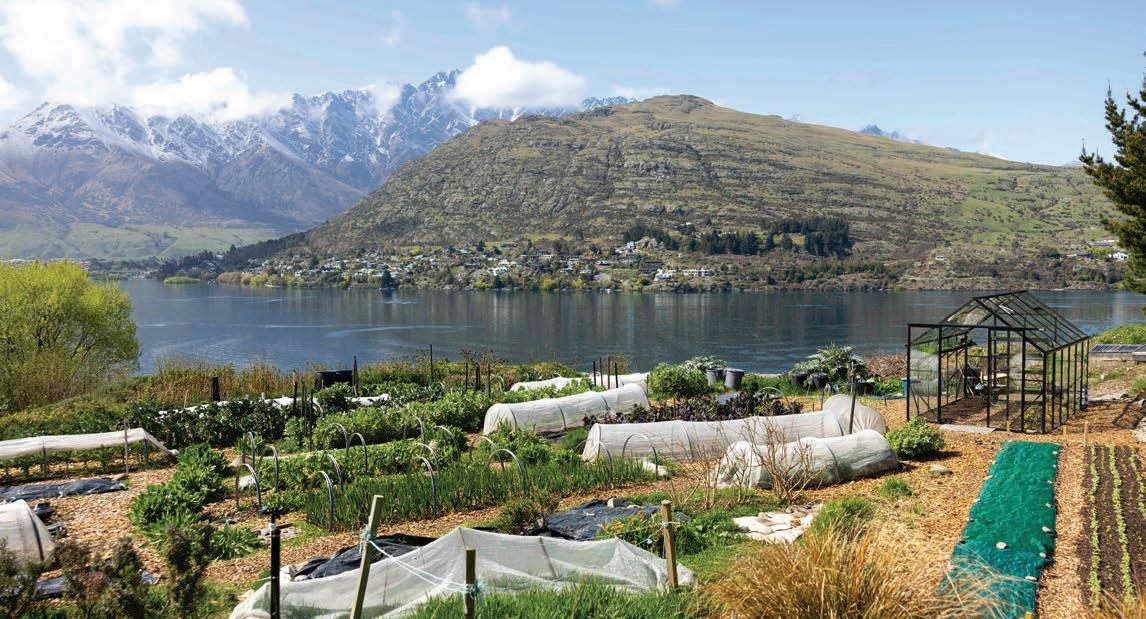
Long before it was in vogue, Sherwood was growing its own produce on a regenerative plot of land beside the hotel restaurant with any kitchen waste going straight back into the land via composting.
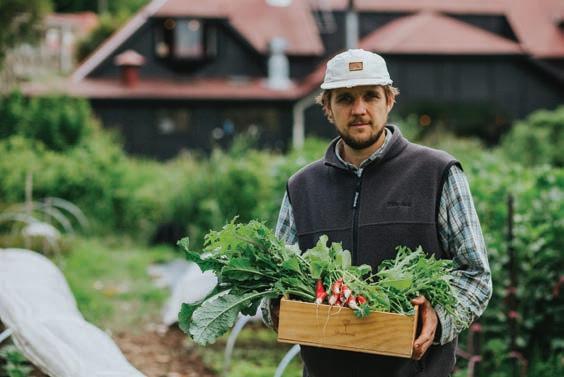
“Provenance is a real big thing, sustainability, regenerative farming, and animal welfare - they’re all big buzz words,” says Chris. “ ere are plenty of new corporates using this in their marketing, but if you dig deeper they’re not really walking the walk. We talk the talk and walk the walk and everyone’s catching up now.”
For years any food waste has been reintroduced
back into the garden soil creating a full growth cycle at Sherwood where they grow all their own produce and sell it in the hotel restaurant. “What we’ve grown determines what our customers are eating that night. It’s a huge thing for us and not many restaurants are operating that way. It’s extremely labour intensive and very expensive but we make it work.”
Plantings are staged from the growing months of spring until April or May. “We stage it in a way that if we run out of something that’s ready, we will be growing something behind it that’s going to be ready straight away. I’m out there checking what’s ready and what needs to be replaced. It’s pretty full on.”
Sherwood has a full-time gardener, Tim Baker, who’s been using regenerative agriculture practices for some years. “It’s pretty amazing what you can do in that small space, perennials too. We grow every herb known to man, plant owers to attract bees,” says Chris. “We sit down six months ahead and plan what needs to go in the ground.”
Climatic challenges have been ironed out and they now stick to what suits local soils.
Any disasters go straight back into the compost. Smaller varieties of tomatoes grow well here, but are slow burners, coming on in late summer. Any surplus produce is picked and dehydrated, preserved, or fermented, for menus down the track. “You’ve really got to be on your game with processing. If you’ve harvested 8 kilos of parsley you need 10 di erent ways to use it, such as pesto, or whatever. It’s pretty challenging,” says Chris. Rising food costs and increasing demand for this type of sustainable practice and food story from customers has the Sherwood team carving out ve or six times more garden space on Mount Dewar where hotel owner Adam Smith owns land. “He’s very in tune with how to keep projects sustainable and aligned with the environment,” says Chris. “He’s planted thousands of beech and native trees.”
ese new gardens should start producing by late January a er several years regenerating the soil for optimum nutrients and growth. All that’s grown will be used in the Sherwood Restaurant where there’s more than enough demand. Garden produce is even used in cocktails in the bar where there’s a full range of natural wines. “It’s really resonated with local clients and international tourists who are seeking something di erent,” says Chris. “ ey want to be sustainable.”
Many businesses are following suit, he says. “You do it because you really care about the environment instead of rolling in with bulldozers and tearing up the landscape. It’s giving back and keeping the land in its natural state.”
QT BUSINESS December 2022 | Issue 25
Sherwood gardener Tim Baker ensuring fresh produce gets straight from the Sherwood garden to the plate
Sherwood’s expansive restaurant gardens
Women in Business morning tea to return in 2023
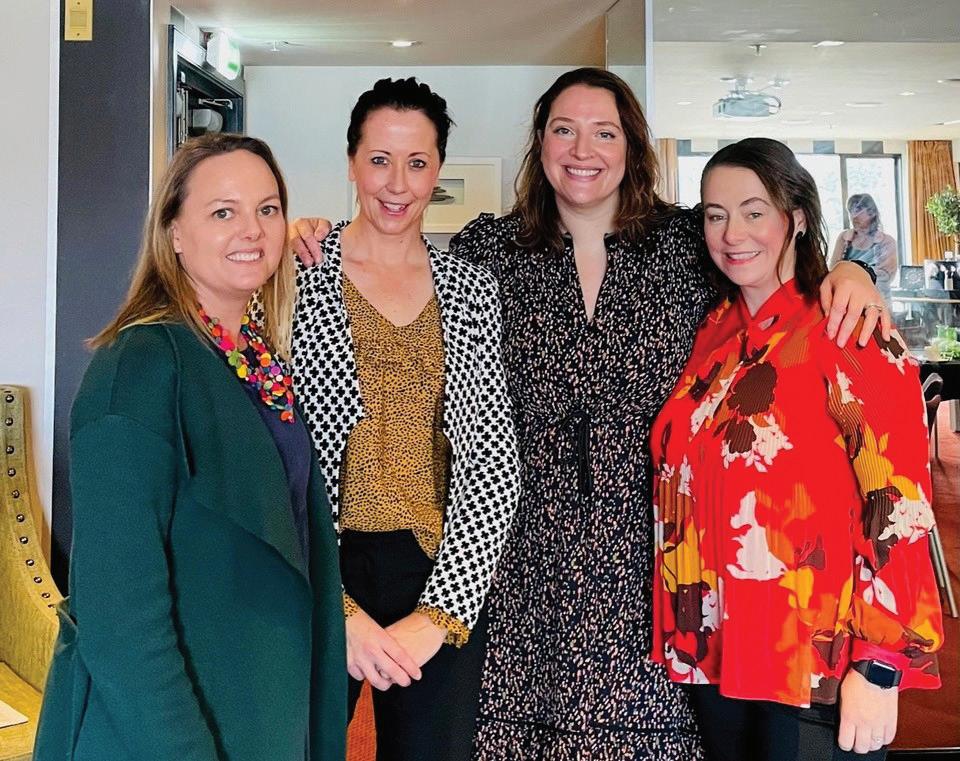 by Jessica Allen
by Jessica Allen
in this industry. I’ve gotten behind the advocacy of trying to speak up about these things and encouraging others to speak up,” says Willow.
e rst Women in Business Series event took place in November of 2021 and featured Wānakabased Anne Urlwin, who shared her re ections on governing during a pandemic. Since then, the event has welcomed a variety of speakers including Tori Keating from xtravel discussing the challenges they faced during Covid, and how they turned their travel agency into a repatriation agency, and Amy MacCormack, an ‘event guru’ with over 20 years’ experience that joined IRONMAN OCEANIA as the Regional Director of NZ, who discussed her journey, and juggling motherhood and leadership.
While the events highlight the achievements and stories of women, the events aren’t exclusive and men are more than welcome to come along. Sara and Angela believe it’s important to have a range of voices, professions, and ages at the events to talk about their experiences. e events have been well received by the community.
A er a successful year of events, the Women in Business Series morning tea will continue in 2023. e events are a partnership between Queenstown Business Chamber of Commerce and Queenstown Airport, who wanted to support women in business, once a month. Each event has a female speaker who talks about their experience in business and the challenges they’ve overcome.
e events are open to anyone and serve as a space for people to be themselves and to come together, share experiences, and network with others in the region. ey aim to give con dence to those in business and facilitate real genuine conversations.
“ e important element for us is making sure that it’s a really safe and comfortable space – and I know that sounds like a bit of a cliché – for women to come together and ask their questions and see role models. Also to recognise that imposter syndrome is a real thing and that maybe they shouldn’t feel it anymore because they’re probably doing a kick-ass job themselves as well, by hearing others stories,” says Queenstown Airport’s Sara Irvine.
Angela Spackman, Queenstown Business Chamber of Commerce Chair, adds; “ at’s what some speakers have done, they’ve talked about their private life as much as their professional life and how they all interact, because we know that they all interact but in a lot of places we pretend they don’t. It’s been really nice having people presenting real things that have happened in their lives and about their impacts.”
e last event for the year took place on 11
November and hosted Willow Rolton, Chair of the National Association of Women in Construction (NAWIC) Queenstown Lakes and apprentice carpenter with Naylor Love.
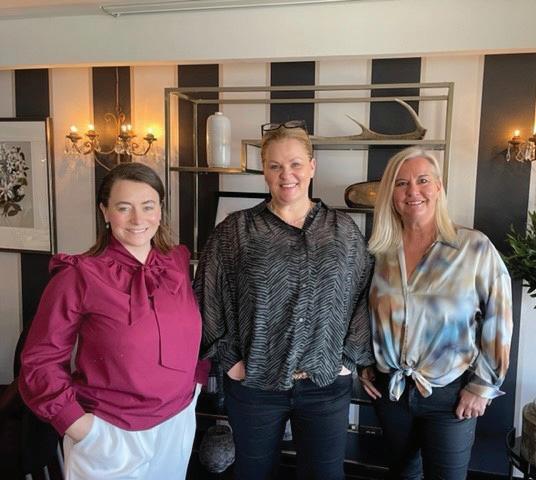
She has worked in construction for the past three years and originally joined NAWIC as she saw that there was a lack of women within the construction industry, so wanted to support others already in construction and encourage women to join. She got involved with the morning tea hoping to share a di erent perspective.
“I think it’s important to share the stories of women in construction and also minorities in construction. I think it’s critical to get out there and share our voice and just let people know that it’s a viable career option for everyone – it’s a great industry to be in.
“I’ve been with Naylor Love for close to four years and it’s been an incredible journey. I’ve loved every minute of it and I’ve got quite a few quali cations under them now. I started o doing gate person jobs and logistics, I worked my way up to crane crew where I got my crane operating and dogman tickets, and I’ve now just nished the rst year of my carpentry apprenticeship. roughout my time at Naylor Love
I’ve seen a massive lack of people speaking out for the woman, people speaking out for minorities, and people talking about mental health and all that sort of stigma we have
“We’ve had a really positive reception, which has been nice. So, we’re continuing for again for another year – it was a no-brainer to continue to do it because people are giving us positive feedback, and we’re enjoying partnering with the Chamber,” says Sara.
Sara and Angela are always on the lookout for women to be a part of the series – not just ‘traditional’ business women, too, but any women in any industry. In addition to the morning teas, they will be introducing one lunch per year as a longer-form version of the talks, allowing more time for discussions and questions. You can stay up-to-date with upcoming Women in Business morning teas or put forward suggestions through the chamber at queenstownchamber.org.nz
QT BUSINESS December 2022 | Issue 25
Rachel Clifford, Events and Marketing Manager
Queenstown Chamber with Adrienne Muir Group Chief Operating Officer at VoxSmart and Melissa Jenner START Now Founder
Left to right: Angela Spackman Chambers chair, Amy MacCormack Regional Director IRONMAN NZ, Sara Irvine Queentown Airport, Rachel Clifford Queenstown Chamber
Bringing life to Christmas
by Jessica Allen
Nestled away in majestic Queensberry you’ll discover a wee haven – SuziQ’s Garden. Here you’ll nd an abundance of specialised Christmas trees, stunning peonies, and locallymade lavender products. Suzette van den Boom is at the helm and has grown it into the beautiful garden servicing the local community that it is today.
e garden came about a er Suzie’s husband passed away. She sold their tree nursery in Queenstown a er deciding she wanted to work for herself and is happy if she has food on the table and petrol in the car. She has experience in farming and has always enjoyed working with plants.

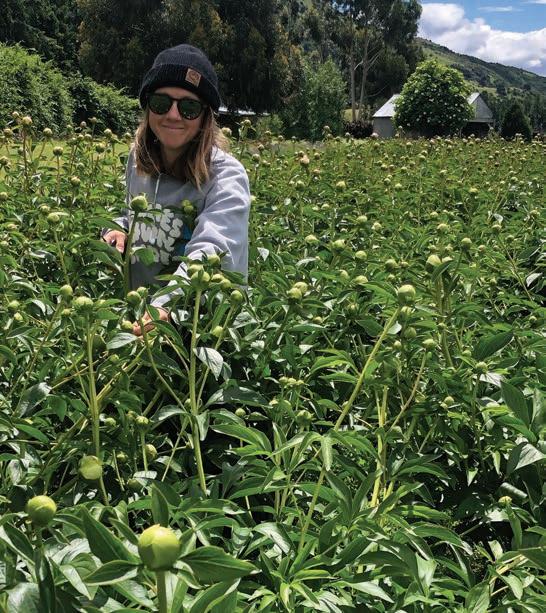
“We had our own tree nursery and I’d grown up on farms – I’ve always lived on dairy farms, or on a family farm in the North Island, so the land was always quite special. I like that rural aspect and I’ve never been afraid of hard work. My husband was a horticulturalist and he always wanted to have a tree nursery – he was also a landscape gardener. e tree nursery came about because he wanted to supply himself with stock,” says Suzie.
Suzie and her husband came to Queenstown in around 1978 and a er purchasing their own farm they developed their tree nursery. At that time farmland in the area had to have an economic use and you had to prove you could make it viable, because farming land wasn’t wanted, which is why the tree nursery was started. ey were soon supplying local businesses including the Millbrook. Suzie’s interest in plants grew and she learnt a lot about growing and soil systems. In between the nursery and her current farm, Suzie studied at Cromwell Polytech to learn more and speci cally growing products in our region.
The soil is really important to grow products that suits our climate, its why peonies do really well in Central Otago
“To grow product that suits our climate and our soil is really important. at’s the success of growing anything. You can’t grow avocado here as it’s too dry and it needs a lot of water and a lot more humidity – we have a dry elevated climate with sandy loam soil – lavender, peonies, and certain trees suit those soils. So that’s what I like to work with – what suits your climate and conditions.”
e garden is a real family a air that Suzie has enjoyed sharing with her family, who live all over the world. Her four children are very involved from wherever they live. eir generous love and support is valuable to the business and provides the encouragement and energy needed to keep growing SuziQ’s Garden. Suzie says that family is so important and she couldn’t do it without the unconditional support.
Suzie was inspired to grow Christmas trees as she noticed it was becoming more di cult to nd them in the wild and didn’t like the waste of plastic trees. e garden o ers a variety of tree sizes and prices start as low as $20.
“I just felt there was a need and this was something I could do when I started seeing that there weren’t Christmas trees around anymore. You didn’t know where to go anymore to go get a tree and a lot of people were using plastic ones. I just love the smell of real trees – it smells like Christmas. It’s those things that remind you of Christmas,” says Suzie.
SuziQ’s Garden also sell essential oils made from
lavender. Suzie started growing the lavender as a companion plant to the peonies, but she always loved the idea of essential oils. “ e lavender oil is so versatile and it’s very user-friendly on the skin, so it’s a topical one.” e peonies that grow at the garden are used for weddings, as centrepieces on Christmas day, and just to brighten people’s homes.
Suzie’s favourite part of what she does is getting to meet the community at the end of the year. She spends most of the year planting and tending to the plants, so she really enjoys getting to meet everyone from late October onwards and helping to make lovely memories for them.
“All year I’m working at the farm and taking care of the plants. I plant the pine trees through the winter, I plant the peonies in the autumn, the lavender gets planted from November and owers in unison from about November through to January, and then gets harvested for its oil, which is quite tricky.
“From October Labour Weekend through to Christmas Eve, I meet the public. ey come in and explore the farm, they can wander around to see the trees and owers. I get to sell my produce, meet the people who are interested, and help them with the festivities. I think Christmas starts with the tree.
“It’s actually a really nice time because other than that, I’m inside my fences taking care of the plants and then I get to really enjoy that social side of supporting people with whatever they want –their wedding or their Christmas or a party, and providing what I grow,” says Suzie.
SuziQ’s Garden is currently open to the public from 8am – 6pm daily along State Highway 6 between Wānaka and Cromwell. You’ll be able to meet Suzie, pick out a Christmas tree, or grab up some beautiful peonies or lavender products. You can nd out more information about Suzie and the garden at suziqsgarden.com
QT BUSINESS December 2022 | Issue 25
A small team has helped out since day one including Natalya in between travelling and university
Sponsored content
Onwards, not upwards for Remarks Park
Remarkables Park Ltd has lowered the height of its planned tech hub building, but the company’s plans for the area remain as lo y as ever.
e $45 million Research & Innovation Queenstown facility, backed by a $22.5m Government loan, has been redesigned in the face of rising construction costs.
Original plans were for the building to be across ve levels, including a basement level, but it is now three-and-a-half.
“It’s a more cost-e ective design and more e cient,” Remarkables Park Group Executive Chairman Alastair Porter says.
“As you can imagine, building material costs had gone up dramatically since we designed the building. is also enables us to build with just one static crane, rather than several cranes coming and going.”
e redesign hasn’t made a great deal of di erence to the oor space, with has been reduced from the original 6000sqm to 5400sqm.
“ e tall part of the original design covered less than half the footprint, whereas the new top level covers the entire footprint.”
Porter estimates rising costs would have seen the project come in 10% over budget before the redesign.
“ at’s not insigni cant when you’re talking about a $45m project.”
e plans have been approved by Queenstown Lakes District Council and Crown Infrastructure Partners, who are co-funding the building on behalf of the Government.

When it was announced in May 2021, the Research & Innovation (R&I) building was seen as a key driver for the diversi cation of Queenstown’s economy away from the pandemichit tourism industry.
by Paul Taylor
e aim remains to attract world-class talent to the region, creating high value and low environmental impact industries.
Finding Research & Innovation tenants hasn’t been an issue.
“We’ve had a lot of interest and we’ve got some fairly major players that are working out how much space they’re going to take.
“Not surprisingly, it’s mostly Kiwi companies at this stage but there are some internationals. ere are some quite well-known names and some you won’t have heard of, but that’s the nature of startups.”
e Remarkable Park Zone covers 150 hectares of land. Development began with the town centre and retail precinct, which was later sold, and expanded east with a mix of commercial, recreation, education and accommodation buildings.
ey include Wakatipu High School and four hotels that have opened in recent years - the Ramada, La Quinta by Wyndham, Holiday Inn and Quest - supported by various ground oor tenants.
e R&I building, a stone’s throw from Remarkables Park Ltd’s own shiny glass corner building, which has Frankton Library on its ground oor, will be another anchor for Hawthorne Drive / Red Oaks Drive block.
A second building complementing the R&I building is still in the works, although its likely to be o ces and ground oor tenancies, and a more familiar rectangle-footprint design.
Across the other side of Hawthorne Drive towards the Queenstown Airport, Remarkables Park Ltd has quietly been nishing roads and infrastructure works to provide around 60 more commercial lots.
It’s fundamentally a huge expansion of the
successful Red Oaks Drive development, tenanted by Game Over, SITE Trampoline, Chipmunks, various gyms and martial arts clubs, and others.
“We’ve done a lot of work over there and have a range of businesses ready to go in, but I’ll leave it to them to make their own announcements.
“It’s commercial recreation, similar to the businesses already there. It’s resource consented for 60 individual lots but that changes depending on what people want, as some will want a larger lot.” And both a conference centre and Remarkables gondola, big projects announced pre-pandemic, are still on the table.
“Covid put a hold on both conference centre and gondola plans. We are again working on the gondola plans, that’s a work in progress.
“We absolutely fully support NZSki’s bid to open up e Doolans [the valley beyond Remarkables ski area] for skiing and if that does happen, a gondola would be very complementary.
“On the conference side, we’ve put a large meeting room in the innovation building, which will be able to cater for around 200 people.
“ at’s an interim position. It’s good to have a meeting facility of that size, with food and beverage adjacent to it. Ultimately, when we can get the conference centre up, that can fold into more tenant space.”
e R&I centre and second building, with their focus on cutting edge businesses, some backed by venture capital, could also be draw a new wave of conferences to Queenstown, making a standalone centre a viable proposition once again. Meanwhile, foundations have been dug for the R&I building, designed by award-winning Otago architects Mason & Wales. Back lling is in progress and Cook Brothers Construction expect to begin on the structure itself in the new year. It should take around 16 months to complete.
QT BUSINESS December 2022 | Issue 25
The revised design for the Research & Innovation Queenstown building
All change at the top
by Paul Taylor
Olivia Wensley is moving on from Startup Queenstown Lakes a er a hardfought but bruising mayoral campaign.
Hers is one of a number of changes in key business support positions across the district. Jim Boult stepped down as mayor, Ruth Stokes is on her way out of Queenstown Chamber of Commerce, while Mat Woods has only been in charge of Destination Queenstown for ve months.
Elsewhere, Sharon Fi eld has moved from the council’s economic development unit to the Chamber, and it’s also notable that well-regarded Bridget Legnavsky, who provided pastoral support for many, has le RealNZ to run Sugar Bowl Resort in the US.
Wensley says it was the right time to step down as chief executive of Startup Queenstown Lakes and move into a venture capital role.
Standing for public o ce was “simultaneously the best thing I ever did and the worst thing I’ve ever done”, she says.
“I have no regrets about running. It really got me out of my comfort zone, I learned a lot and it was a fantastic thing to do for personal growth.
“But it was hard going and a er the experience I had I just have so much respect for people that have a public role like that. I’m really happy to have my privacy back.”
Wensley’s campaign was derailed by focus on her links to Queenstown’s leaky building problems - her father-in-law Ross Wensley developed the Oaks Shore, for which ratepayers could ultimately end up paying a $160 millionplus repair bill.
Opponents Glyn Lewers, who won the mayoral race, and Jon Mitchell claimed that was a con ict of interest, meaning she’d be unable to participate in council decisions.
“It’s ridiculous, trying to tie me to a project from more than 20 years ago. In hindsight, I’d have hit back earlier, got rid of the stupid rumours and innuendos, nipped it in the bud. It was a smear campaign, and it worked, people listened to it.”
She doesn’t, however, intend to follow through on a police complaint she made towards the end of the election.
e viciousness and judgement on social media from locals was also nasty, she says.
“You have to have a very thick skin, which I do. I knew it would be awful but had a rm belief that the net good from serving the community would be greater than the awfulness.”
With all that in mind, Wensley says she feels huge relief to not be the new mayor.
“I should probably send them all [her mayoral opponents] a bunch of owers. I wasn’t afraid to roll my sleeves up and do it, because I know I have the skillset to improve the region and make things better for the community.
“I was willing to spend a few years of my life for public service, because you don’t do it for the money, but would it have been my favourite thing to do in the world? No, probably not.”
But she would still encourage other professionals to stick their head above the parapet.
“Hopefully I changed people’s thinking about who can be leaders in the district, and also brought the problem of economic diversi cation to the forefront.”
Her campaign also garnered national attention and since it wrapped, she’s been inundated with job o ers.
She in the process of deciding between o ers from two venture capital companies.
Venture capital funds raise money, in the tens of millions of dollars range, from limited partners, such as high-net worth people, their family o ces and superannuation funds, then nd the best companies to invest in.
“I’ll be working to get investment into early-stage start-ups, so it’s the perfect
use of my skills, attracting investment into our region, promoting Queenstown as New Zealand’s up-and-coming tech destination.
“It’s a similar role to SQL but more elevated, with more resources, better pro le, a national role, and I’ll be focusing on opening the rst physical venture capital premises in Queenstown.
“ at’s what I’m passionate about. I don’t think people realise how much potential there is here. I’ve been at the coalface and there are amazing things happening in this region. It would blow people’s minds to know the kind of talent and the companies that are being developed.
“People thought my campaign was too future-focused, it’s very easy for the average Joe to say ‘automated vehicles, yeah that’s not happening’, but we need to be embracing technology.”
Wensley was recently named one of NZ’s 50 most powerful lawyers by LawFuel in recognition of her advocacy work and mayoral campaign, and earlier this month was invited to be a moderator e Tech Summit 2022, hosted by Hon Judith Collins.
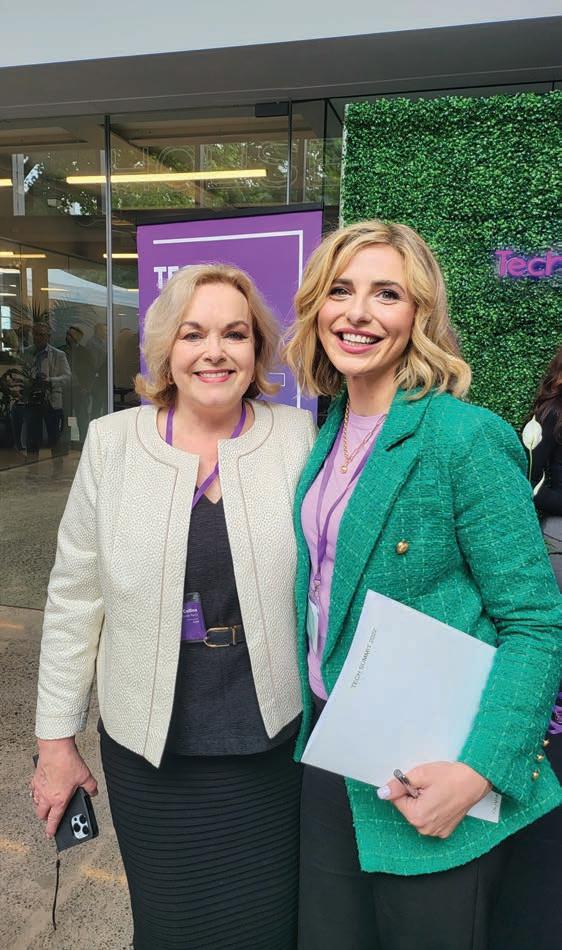
She’s been shoulder-tapped to become a politician at a national level but for now will instead use those connections to lobby for change from the private sector.
“Chris Luxon [National Party leader] and Judith Collins are very excited about the future of Queenstown and tech, and there are some great developments coming along.”
QT BUSINESS December 2022 | Issue 25
Olivia Wensley and Hon Judith Collins, at The Tech Summit 2022 earlier this month
End of an era – beginning of a new one
by Sue Fea
ey’ve been the face of fresh and specialty food in Queenstown for almost 30 years, but Nathan and Angela Imlach recently hung up their grocery aprons for a well-earned break.

e Imlachs sold their long-standing Raeward Fresh Queenstown, originally Queenstown Wholesale Market, then Mediterranean Market, to Picton supermarket owners Jono and Jess Ettema.

“It was the right time to inject some new, young blood and Jono and Jess have a good knowledge of the industry, and are passionate and energetic,” says Angela. “Queenstown’s been very loyal to us. It just feels right for somebody else to take the baton and keep going forward.”
Lockdown periods were probably the Imlach’s most di cult trading times. “ e hardest thing in recent years has been constant increased compliance and regulations costs,” says Nathan. “Businesses have been pushed sideways with every new regulation, and costs changing.”
Twenty-eight years of seven days a week, in addition to the events of the past few years, has taken a toll, and while the Imlachs are only 54 and not ready to retire yet, a couple of months chilling out is just the ticket. ey’re enjoying golf, biking, boating and gardening before deciding what to turn their hands to next.
“We’ve got no idea, but we’ve had a lot of o ers, plenty to be kitchen hands,” laughs Nathan, who came from a hospitality management background with the Invercargill Licensing Trust. Angela hailed from a radio and car sales background, and when Nathan’s late Southland farming parents, Ron and Pat Imlach, invited them to join in the original Queenstown Wholesale Market in 1994 the opportunity was too good to turn down.
Opening with business partners in Wānaka and Te Anau Wholesale Markets, and Angela’s sister Nadine, and husband Grant, who just happened to be Nathan’s brother, it’s been a successful family business all those years with
various progressions. Sister Sandra Bragg started washing and bagging lettuces years ago and later became barista in the store café.
Queenstown Wholesale Market, hugely busy then supplying the local hospitality industry and locals, was bought by food service supplier Crean’s in 2005, which later became Bidfood. By then Angela and Nadine had already launched the popular Mediterranean Market store, now Raeward Fresh, in Robins Road so she and Nathan focused on that business, building up a strong local following. “When we rst started our point of di erence was our imported goods from Europe,” says Angela. “However, in the last 10 years that’s changed to more demand for local home-grown New Zealand products as producers here have matured their o erings. We always chose quality New Zealand products if the price was right.”
It’s been important to keep up with those market trends and the Imlachs are very grateful for the research and e ort that’s gone in from product development manager Rebecca Hunter and Grant Rixon, who handles procurement.
It hasn’t been all hard slog. Avocados used to be ripened on the warm waterbed in the at above the original market. “If somebody in the team had a late night and ended up staying in town they had to either lie on the avocados or move them, depending on what state they were in,” grins Angela.
Daughters Georgia and Ruby were enlisted from a young age, two and four – one on a stool and one passing, ensuring those avocados were ripened in the family’s hot water cupboard. “It was a very slow process,” recalls Angela. With so many family involved in the original business, Imlach family dinners meant Nathan, his father, brother and uncles would use shop codes to request tomato sauce, chutney or pepper, passed to them at the table.
QT BUSINESS December 2022 | Issue 25
Jono and Jess with their children, Reggie (7) and Sophie (5), outside their new business – Raeward Fresh Queenstown.
Angela and Nathan have been the face of Raeward Fresh for almost 30 years
Sta Christmas parties were renowned with the Imlachs o en hiring a live band on their home lawn. “We’d most o en have at least 12 or 13 nationalities working for us at once. We loved those young working travellers, adding a multicultural food experience. ey took us around the world daily,” says Angela.
e Imlachs have always made a great team and switched roles when necessary to accommodate young children, ensuring Nathan had time to serve on the Queenstown Primary School Board of Trustees and St Hilda’s Collegiate Board of Proprietors. For Jono and Jess it may seem a hard act to follow, but they’ve slotted in comfortably, retaining the Imlachs’ great team.
e Ettemas owned Picton Four Square and previously Jono managed Raeward Fresh Nelson, a er a ve-year stint as store manager for two large Wholefoods Markets in London. “ at was a very cool company to work for and we’re hoping to bring that vibe to Queenstown,” says Jess. e couple took over on October 3 and, like the Imlachs once did, love the convenience of having two small children at Queenstown Primary School just along the road. “We were caught a bit by surprise when we saw Ange and Nathan had put the store on the market,” says Jess. “We were in the store about four years ago on holiday and Jono said, “If I ever happened to have the privilege to own this store, it would be the opportunity of a lifetime.”
e Ettemas are remaining passionate about fresh, unique and local. “We’ve brought in some new lines with a big focus on Christmas goods, like beautiful German and French chocolates, exclusive wines, gi ware and Christmas lines that tie in with the café.”
ey’re looking to expand the catering arm of the business and are fortunate enough to have just hired one chef, with a second hopefully joining them soon. “We’ve always had an amazing sta base and that helps to attract other sta .”
“ e catering menus were scaled back during Covid but we’re looking to expand that again with more beautiful salads, platters, meats and other o erings for the New Year so there’s more choice,” says Jess. Raeward Fresh favourites will stay, like the Lemon Syrup Cake, and Raeward Fresh’s renowned hams and fresh, free range turkeys.
Jono and Jess are adding a wonderful new range of Christmas cakes from Pohutukawa Pantry in Christchurch. “We’re really focusing on local o erings and people can come to do their full shop or buy for special occasions.”
e popular 25 to 30-seater café is another exciting aspect of the business for Jono and Jess, both “super passionate foodies”.
And in a way for Jono, it’s completing a full circle of his career, a er working his way up from produce assistant in nearby Dunedin for Foodstu s, and being mentored through its Leadership Programme.
e Ettemas are totally prepared for the long hours and hard work that’s ahead. “You have to work hard to achieve your dreams,” says Jess.
Good news, not so good news - and consequences
e Good News by Xmas:
• You can o er customers a service that exceeds their expectations
• You can increase the company or your personal productivity
• You can increase pro tability
• You will have stable, motivated and productive sta
• You will be able to merge personal and business objectives into a common set of goals
• You will be able to take advantage of any government funding
e Not so Good News is in the headwinds on the horizon:
In ation will remain at levels not seen for many years
• Interest rates are on the rise increasing the cost to business as the Reserve Bank tempers down in ationary pressure
• War in Europe is causing angst across wide areas of political, economic and nancial sectors across the globe
• Ongoing lack of labour is pushing up wages and decreasing productivity esp where technology isn’t a solution
• Increasing product shortages – ranging from horticulture (no pickers) to high quality metals for tech componentry
• Supply line and transport delays and shortages
All or any of these issues decrease consumer and business con dence which increases recessionary risk – people and businesses spend will slow. is is bad for us all – people lose jobs, businesses lose money, bankruptcies happen, stock market drops, and lenders stop lending – etc.
For your business it would be wise to factor the consequences above and factor them into a detailed business plan for 2023 that can be reviewed regularly and forms the basis of all your business decisions.
e local opportunities currently are strong as the local economy bounces back but the headwinds are real and should a recession strike, as it already is in a number of economies, there will be local impacts.
Included in your plan consider:
• Completing an updated SWOT (strengths, weaknesses, opportunities, and threats) analysis
• is will identify your priorities to enable business goals to be set
• Create objectives and strategies and an action plan to achieve your goals
• It will create a way to operate your business for customers, sta and suppliers
• It will help to create a vision, mission and values for your business
• It will help to determine nancial, people and capital resources you will need
• It will set in motion a review mechanism to make sure your goals are achieved
I recently completed a business plan for two clients resulting in them being able to access of goverment funding, and bank acceptance of loan applications for over $350,000. ey were also able to complete accreditation for the Visitor Visa programme.
If you know this is important but need help to achieve a positive outcome to come through a potentially di cult period ahead, please contact me for a free initial chat.
0275 212 728
robin@martinbusinessconsulting.co.nz www.martinbusinessconsulting.co.nz

QT BUSINESS December 2022 | Issue 25
Robin Martin
Robin Martin Business Consulting
Investing in a remote lifestyle
Life’s too short not to work remotely and get the best out of it, or so it seems for a new generation of highly focused professionals who don’t need to be in the o ce from nine until ve.
Increasing numbers of professionals are settling in Queenstown, many attracted by the events of the past two years, or simply wanting to escape the city and head for the mountains.
e Mountain Club general manager Paddy Kluts says the club now has 250 members making use of not only its co-work spaces in Frankton and central Queenstown, but its leisure programmes and facilities.
“We’re seeing big growth in the 25 to 45-year-old market, highly engaged, successful people who are coming to town to live and work.” says Paddy. “ ey’re coming here for the lifestyle. ey don’t want to slog for 12 hours a day in an o ce, but they also don’t want to give up that community aspect.”
Mountain Club members can therefore access everything from its work spaces to hospitality and events facilities. ere are two cafés for members and guests. Members can also relax and enjoy a game of pool and a drink at e Mountain Club Bar, says Paddy. Remote workers are still seeking that connection and e Mountain Club o ers free yoga, mountain biking groups, free tastings, conversation series and business development classes. Personal development and community are all part of the package, he says.
Some of the growth has come from businesses that started by hiring one desk and now take a ve-person studio. at exibility is important, says Paddy.
“People have only been able to come here from overseas since July but we’re starting to see members from Australia and further a eld using
by Sue Fea
our facilities now, and a lot have relocated from Auckland.”
ese people want to work to a exible timetable and create lifestyle changes, so Queenstown is the perfect choice.
“Everyone’s making real choices. We’re not getting people who are wedded to their job but people who are invested in their lifestyle,” says Paddy. “Queenstown used to be the place where you slogged in the city and this was your reward, where you’d buy a big house and play golf every day. Now people invested in lifestyle are coming and bringing young families.”
Every industry is represented – tech startups, water quality professionals, property management, lawyers, accountants, designers. “ e tech industry is what’s really coming through now as there’s a lot of exibility in that market.”
Sydney-based Public Sector Network (PSN) has been ying the remote ag since it was founded in 2012 and now has about 140 remote working sta in six countries worldwide, two based in Queenstown.
PSN co-founder and ceo Ross Ashman says as a start-up the company launched with remote sta as it made economic sense and kept overheads low. PSN does research, produces events and o ers advisory services for governments globally. “Pre-Covid our remote model was a really unique selling point to people wanting to join… that we weren’t going to micro manage them from nine to ve,” says Ross. “We said, ‘We trust you enough to hire you so we trust you to do the job’. It’s an opportunity for people to be given that trust straight away and then work how best it suits them,” he says. “ at opened up a big talent pool in larger states and jurisdictions, and ultimately countries.”
PSN does still have a small o ce in Sydney where sta can hot-desk at any time, just for that camaraderie. “It’s still a challenge to replicate that community. It isn’t easy. You de nitely lose that spontaneous discussion, the ability to turn and ask a question, or crack a joke, but there are other big wins and gains if you’re organised and e cient,” says Ross.
e key for employers is to ensure they’re really organised and using all the various project management tools available to them so that all sta have visibility on what their colleagues are doing, he says. Employees need to be clear on deadlines, but managers still need to manage, support and be there, coaching sta and ensuring they’re okay every day, he says.
Culture comes from employing the right group of people. “ e art of a good culture is to not hire dickheads. You can train skills, but you can’t train attitude.”
A newly-released report from Employment Hero, the 2022 Remote Work Report, reportedly found 48 percent of employees surveyed said they would consider quitting their job if their employers forced them back into the o ce full-time.
Ross isn’t surprised. “ e genie’s out of the bottle,” he says. “Young people had been told prior to Covid times that it couldn’t be done but now they’ve seen that it can they want that extra exibility and time in their day,” he says. “Why would you spend two hours travelling every day, paying for lunch and co ees, that inherent extra cost if you work at the o ce, when you can have an extra hour, walking the dog, lying in, or spending time with the kids?”

QT BUSINESS December 2022 | Issue 25
The Mountain Club now has two venues – Frankton and Beach Street
Hybrid work is the new model
Director of Research and Innovation
Queenstown Limited Johnathan Chen says most companies accept that hybrid work is the new model, given the current labour shortage and how hard it is to retain sta . “It’s important for companies to retain key sta , regardless of where they are physically,” says Jonathan.
“We’re certainly getting business owners and sta telling us remote work is a growing trend,” he says. “People are telling us it’s a real possibility and aspiration to work from Queenstown and that was one area we wanted to tap into with regards to the Research & Innovation Queenstown project.”
e new Research and Innovation Centre, currently under construction at Remarkables Park, is set to open in 2024. Johnathan says there’s already interest in space in the new centre, both nationally and internationally.
It will feature a range of mixed use space across a gross oor area of about 5400 sqm, which will include o ces, networking areas, meeting and AV presentation rooms. “ ere will be a good mix of food and beverage spaces, nice areas for the teams to get together, which is important for the new hybrid work model,” says Jonathan. Ziptrek executive director Trent Yeo pushed hard for a Remote Worker’s Festival back in 2020. He and Johnathan both believe more can be done to attract the high-yield remote worker market to Queenstown.
“I tried four times as a Covid response to get the festival o the ground and there was lots of interest, but Covid restrictions meant it had to be cancelled each time,” says Trent. ere are many advantages, including the carbon neutral aspect, and Trent says, while there are some moves afoot, more could be done to tap into this market.
“We’re already known as a major destination and can outpunch our weight and because of that our reputation precedes us. If we can provide opportunities for meaningful and productive work where people want to be then their life satisfaction and productivity will be higher,” says Trent. “It’s about having a sense of place.”
ere are already some highly quali ed professionals working remotely ying under the radar, he says, including one from Sony Pictures, and others working for large international venture capital companies.
Benje Patterson - ‘set your own boundaries’
by Sue Fea
Arrowtown-based economist Benje Patterson has been working remotely from
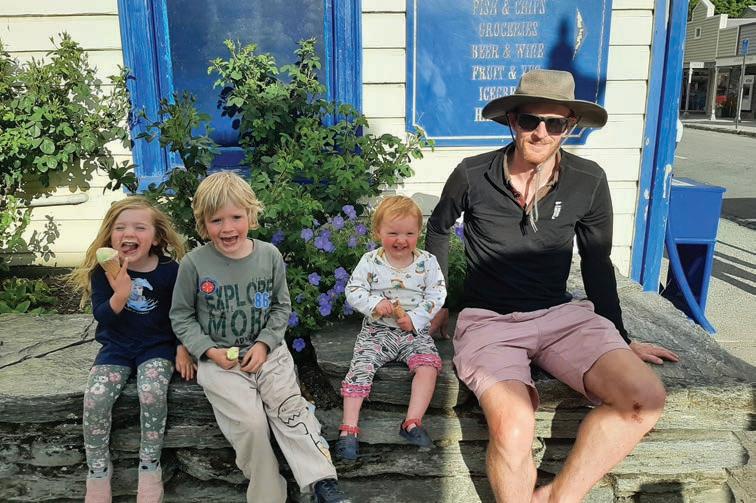
for six years now – long before it was fashionable, and the young father of three wouldn’t have it any other way.
“Ironically, I now travel a lot less than I originally did, which is awesome,” says Benje, 35.
e shi online during the past two-and-a-half years, due to Covid, has changed the face of how we do business permanently and for Benje that’s for the better. “I used to travel 50 to 70 times a year. Now I travel between 10 and 20 times a year.”
Prior to the move south, Benje was an economist in Wellington for six years, fresh from post graduate studies at the University of Freiburg, Germany.
Working for Infometrics in Wellington gave him a really strong grounding in macroeconomics. “ at gave me a really broad background structure in economics. I learned about big business, government, trade and international trends, everything that makes up the industry,” he says.
However, Benje felt he was disconnected from the coalface – “the real people, doing real things every day. It felt impractical.”
During his time at Infometrics, Benje started getting into more regional economics, focusing on smaller areas. “We developed so ware solutions for economic agencies, councils and government.” rough this he was engaging with clients, teaching them how to use the information. “It brought economics alive for me. People used it to make real decisions.”
Living permanently in Queenstown had always been a life goal for Benje, who grew up in Invercargill. “Early on in my career I realised the big city was not for me. I loved the mountains.”
Initially in 2016 he worked remotely from the Wakatipu for Infometrics, heading up its regional arm. “ ey were quite pioneering doing that back then and it worked well professionally for me.”
Eventually Benje found life had become somewhat “geographically divided”. “My focus was split socially and professionally. My work focus was on Wellington, but I felt emotionally disconnected.”
So he set up shop himself in Arrowtown, working closely with clients.
“ e irony is I now do a lot more work around the country from here, as well as being geographically closer to clients,” says Benje. “Head o ce was no longer an aspect of my day so for the last threeand-a-half years I’ve been doing my own thing.”
Now a father of three, spending more time with his family have de nitely been a factor in Benje’s decision to work remotely. “I respect big cities and they’ll always play a big role for me professionally, but I get my kicks out of heading into the hills. I feel cooped in otherwise”.
For Benje it’s the exibility of his remote work lifestyle that’s the biggest appeal. “However, that can be a false friend so you’ve got to be careful that work doesn’t encroach on life. You’ve got to create your own boundaries,” he says. Remote work allows him that exibility to pick up the kids, or, if the snow’s good, head up the mountain. “You’ve got to be careful though that you’re not always working weekends, or nding yourself constantly checking emails.
“My motto was always, ‘Never say no’, as if you do word gets around that you’re too busy and people begin to tell your story for you. Now I’m careful though to communicate clearly with clients and to ring fence and block o time in advance, either to work solidly on a project, or just have free leisure time.”
QT BUSINESS December 2022 | Issue 25
Arrowtown
From left, Frida, Archie, Ruby and Benje Patterson
Max Norton - ‘jump in and give it a crack’
by Sue Fea
at e Mountain Club. Max says it’s important to have that camaraderie. “It’s good for your social well-being. I’ve got friends there, but they’re not my co-workers. We can be good friends without having to work together,” he says.
Max wouldn’t go back to a non-remote role. “I think, post Covid, everything’s changed. I love the exibility. If I need to do a daycare drop-o I can make up the time.”
Occasionally he will go skiing or bike riding before work. “I keep a pretty good schedule, but it’s knowing that if I need to I can dip out.”
Having that time in Sydney rst to establish a professional network was important, meeting other developers and designers in the industry, he says.
Marianna has begun a remote role for the BNZ in which she only has to travel to Wellington for a few days a month.
e couple has built a new home at Jack’s Point and Max says he has plenty of Auckland friends who want to join them in Queenstown. “ ey’re currently trying to convince their bosses to let them move down.”
His advice is ‘go for it’, but visiting Queenstown and living here can be quite di erent, especially with the rental housing challenges. “Make sure you’re aware of the realities, whether they’re accommodation, housing or roadworks. ey’re just growing pains, but yeah, jump in and give it a crack,” says Max.
Max Norton, 34, born and raised in Queenstown, has returned as a remote worker with wife, Marianna, and their two-year-old daughter Florence.

For Max, who’s worked overseas since graduating from Otago University, remote work is not a new concept.
“ ere weren’t too many jobs here when I graduated so I headed to London, which opened my eyes to the tech scene,” he says. “It was called the Silicon Roundabout and the tech scene was just taking o .” General Assembly was o ering short courses in computer coding in London so Max took up the opportunity. He worked for a travel so ware company until his visa ran out then landed in Sydney where he cut his teeth in the tech world as a so ware developer for ve years. “I was working for digital agencies then I got into the product side of so ware development.” Max built up enough contacts in Sydney to start contracting his services freelance and landed a couple of big contracts.
Marianna, a successful lawyer, worked in Sydney and the couple worked remotely back in her home country of Brazil for a while. “It opened my eyes to the possibilities for remote work,” says Max. “I was working remotely for two or three years before Covid hit so I’d become used to it,” he says. “It takes a while to get your head around remote working. You need good discipline.”
He’s been working for PLANN for more than three years, one of a team of nine developers.
“We build and sell a SaaS (So ware as a Service) product which makes it easier for companies to schedule content across their social media accounts.
“We also have a bunch of designers and developers in Ukraine and the Philippines with good English and tech skills. e company tries to keep a balance between New Zealand, Australia and the Philippines, focusing on each country’s strengths.
“Sydney is great when you’re under 30, but I wanted to be closer to family. at was a big thing.” e couple worked remotely from Brazil initially for eight months, and were married there.
“Skiing and biking are my two biggest passions so that was a huge pull factor too,” he says.
In 2019 Max and Marianna moved to Queenstown where he’s enjoying working remotely

QT BUSINESS December 2022 | Issue 25
Enjoying what it’s all about – Max (centre), Marianna (left), Florence (front) and Max’s sister Myfy having fun on Coronet Peak
Max and little Florence enjoy some café time out
Brace yourselves – summer will be big
by Sue Fea
Boom times are back and while it should be a celebration for local businesses it looks like chronic labour shortages will ensure the busy summer predicted ahead may look more like a mine eld for employers. However, it’s not all bad with some temporary help on the way for the peak season, in the form of working holiday visa holders from overseas.
Queenstown has just come o the back o a record winter, even surpassing that of a very buoyant 2019, with visitor spending from June until August reaching $252 million, according to Destination Queenstown. at’s compared with $212 million for the same period in 2019. Most of that growth has been from the domestic market.

Arrowtown-based economist Benje Patterson isn’t predicting the worldwide labour shortage problem to go away any time soon. Queenstown’s always struggled with sta and accommodation shortages, even prior to Covid, he says.
“Essentially we’re ghting in a war for workers globally, he says. “In many developed countries there’s an aging demographic set to retire so places are desperately seeking to ll these roles.” In New Zealand, one in six people are over 65 and in the next 20 to 30 years, according to Statistics NZ, that will be one in four, says Benje.
“Businesses need to realise this is not a cyclical thing. It’s a long-term challenge, how we access workers when competing globally,” he says.
Labour saving technology and automation may take some signi cant upfront investment but in the long run it will pay o , says Benje.
“In a restaurant or hotel there’s a lot of manual work requiring people power, but technology, like automated booking systems and online systems to order drinks, can maybe help do away with two of your 10 sta ,” he says.
Collaboration will also be key moving forward. “Instead of tourism operators competing for visitors with their own individually branded courtesy vans they could out-source to one company that does it for all.” It’s not going to work for all types of businesses, but some can reduce costs dramatically by adopting new practices and technology systems, says Benje.
e Australian ski market was key to the record winter Queenstown experienced. “As soon as the borders opened it went o . Australians had been stuck in a perpetual mirage where they couldn’t see, feel, or touch New Zealand and there was a lot of pent up demand,” says Benje. “ en
the big dumps of snow set o an amazing and consistent season.” Prior to that Queenstown had been looking at an estimated $3 million loss to its economy during the July school holidays due to labour shortages, he says, but thankfully it was a boomer. “ at came at a cost though.”
Restaurants had to cut tables, hotels close rooms, there were long queues, and you couldn’t get a bus up the ski eld sometimes. “But we managed very well.” His main concern is how that will have all a ected Queenstown’s long-term tourism reputation.
A government survey of working holiday visa applicants shows Otago’s high on the list for summer and that they’re keen to work in tourism and hospitality. “I’m cautiously optimistic we will get a few passing through which is fantastic. ey will be highly valued and take some of the pressure o .” However, you can’t train someone to wait ve-star restaurant tables if they’re only here for a few weeks, he says.
Queenstown Chamber of Commerce head of business growth Sharon Fi eld says the government has approved 30,000 to 40,000 working holiday visas. While Queenstown’s been identi ed as a hotspot with Immigration NZ, some employers who’ve received potential job applications say workers can’t get accommodation, she says.
e chamber and council have been advocating at government level for changes to local residential zonings to allow wider approval of accommodation supplements, and simpli cation of secondary tax requirements. “With such a tight labour market, it would be great if employers could share sta and coordinate on those days they’re having to close due to sta shortages. However, current secondary tax rules are a disincentive to workers in picking up extra work,” says Sharon.
Queenstown’s lost a lot of labour these last few years. “Each quarter we churn about 20 to 25 percent of our workforce, meaning around 4000 jobs need to be lled with new sta as others have le or moved roles. at’s a lot of work for businesses,” she says. “It’s de nitely an employees’ market. Workers are moving jobs for even 50 cents an hour or more.”
Employers need to reduce that churn and retain sta , not just with pay incentives, but well-being initiatives, training, development, and team culture, says Sharon.
Like Benje, she says small businesses need to work together to reduce costs. “ ere’s a lot of duplication.”
Queenstown’s heading for a boomer summer and everybody recognises it’s going to be tough, but local high school students are already stepping up and they’re in high demand. “Without any considerable in ux of new workers, we need to tap into our under-utilised older workforce, and those with disabilities. Everyone’s pitching in,” says Sharon. It’s hoped people with a spare room may also rent those out to workers. She urges business owners to look a er themselves. “We’re doing all we can to help, but be patient,” she says.
“Brace yourselves. Summer will be tight.”
QT BUSINESS December 2022 | Issue 25
At a glance - Queenstown Lakes jobs market
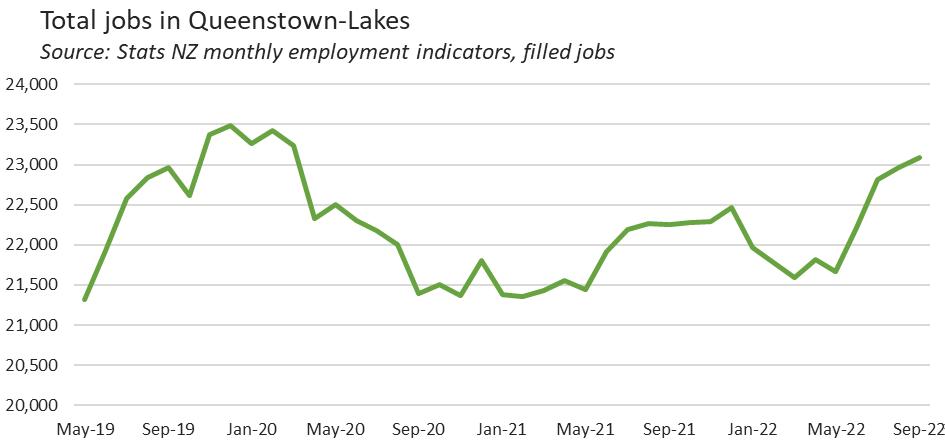
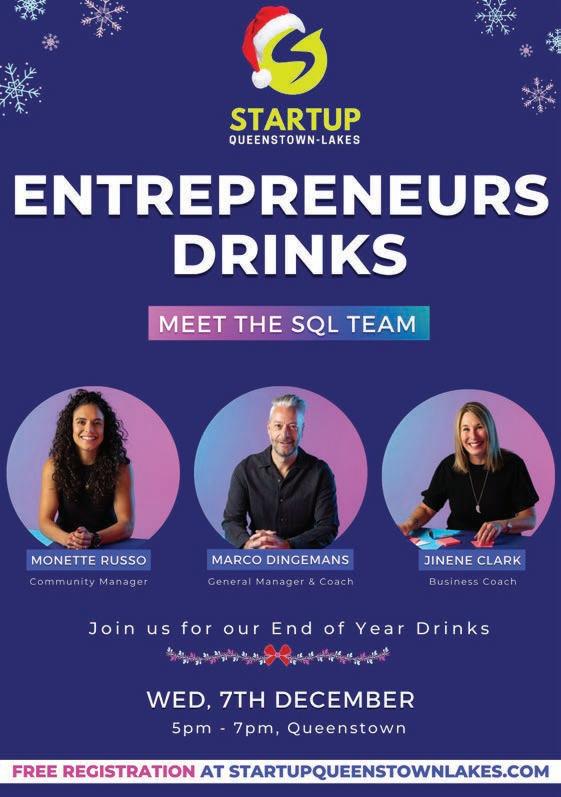

QT BUSINESS December 2022 | Issue 25
Lakes’ labour market snapshot to hat staffing shortages
• • o o • • • • continued reductions to ‘work ready’ Jobseekers and employer • Lakes’ labour market snapshot to
aren’t going














 by Jessica Allen
by Jessica Allen















